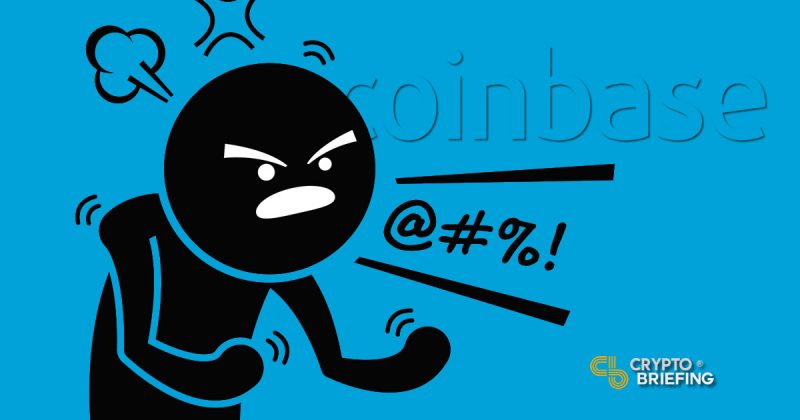
Coinbase Neutrino Outrage: We Need To Quit Bitching Now
Outrage over the Coinbase / Neutrino fiasco is ill-considered. There are tradeoffs involved in using the tech of any centralized authority.
#DeleteCoinbase!!!! Quick! Delete it now! Coinbase has gone rogue, it’s hiring crypto-fascistic neo-Nazi hacktivists to sift through our data and, I dunno, DO things with it! It’s all Brian Armstrong’s fault! Delete Brian Armstrong!
Oh please.
What exactly did we expect? Whatever the true nature of Coinbase’s recent public relations clusterfuck, they are a centralized authority whose naked ambition is to join the ranks of the established financial elites and meld seamlessly into the infrastructure that most of us rail against. (We’re all good capitalists here.)
Cryptocurrency may still lack clear regulation in the U.S., but Coinbase operates within a framework that’s pretty well-established. It’s registered with FinCEN (the Financial Crimes Enforcement Network); it’s a licensed money transmission business in many states; it complies with the USA Patriot Act; and it maintains records of currency transactions for five years – and reports some transactions, per the Bank Secrecy Act.
But they hire a couple of slimeball Italian hackers, and we all go nuts?
I’m not defending that decision. It was clearly ill-conceived, and the communication from Coinbase ever since has been almost comically indefensible. But compliance comes with a cost.
Subpoenas are expensive. And as we know from people like Erik Voorhees at ShapeShift and the Kraken exchange, they have been issued at an exponential rate since the 2017 crypto boom.
Peek at our Compliance team’s 2018 Transparency Report. You can see why many businesses choose to block US users. Cost of handling subpoenas (regardless of licenses) is quickly becoming a barrier to entry. Inquiries up 3x YoY. pic.twitter.com/YbyLEqhOUf
— Kraken Exchange (@krakenfx) January 5, 2019
Within the industry, the cost of conforming is rising. Coinbase’s acquisition of Neutrino, whether well-vetted or otherwise (and contrary statements have emerged on that issue) was likely the result of a simple cost-benefit analysis of excluding potentially problematic accounts. Business as usual, set a scumbag to catch a scumbag.
What doesn’t make sense is the hysteria surrounding the announcement.
If you share your photos on Facebook, they’re not yours anymore. If you bank with JPMorgan, your transactions are their transactions. And so on.
Coinbase provides a service, charges a fee, and sells data. It’s not news. Everyone does it. And we accept it – we exchange some portion of our privacy for their technology. That’s the deal.
If you use Coinbase, or any other centralized authority, that business or agency will find a use for your data. You can read their privacy policy, you can read their terms, and you’ll usually find that in exchange for using their service they can sell information about you. It may be aggregated, it may be personal, but whatever it is, a central point of failure means there is the potential for abuse or tricky legalese. There’s the potential they’ll hire a bunch of Italian hackers who scare the shit out of you.
Brian Armstrong finally said something unequivocal about the matter, probably the best thing I’ve read on this all week:
“We sometimes need to make practical tradeoffs to run a modern, regulated exchange, but we did not make the right tradeoff in this specific case. We will fix it and find another way to serve our customers while complying with the law.”
And there you have it.
If you don’t like centralization, and you don’t want your data shared, there are other options. They’re just not always very convenient – although decentralized exchanges are coming to the fore.
Everyone makes the occasional bad hiring decision, and this one appears to rank with the worst of them. But the outrage in our community seems feigned. We know the cost of doing business with Coinbase and Facebook, and every other centralized data collector: and we choose to do work with them anyway.
Is that lazy? Is it stupid? Or is it, as Brian Armstrong noted, simple pragmatism?
Everybody makes tradeoffs.
The author is invested in cryptocurrencies and has not deleted Coinbase.

 Earn with Nexo
Earn with Nexo